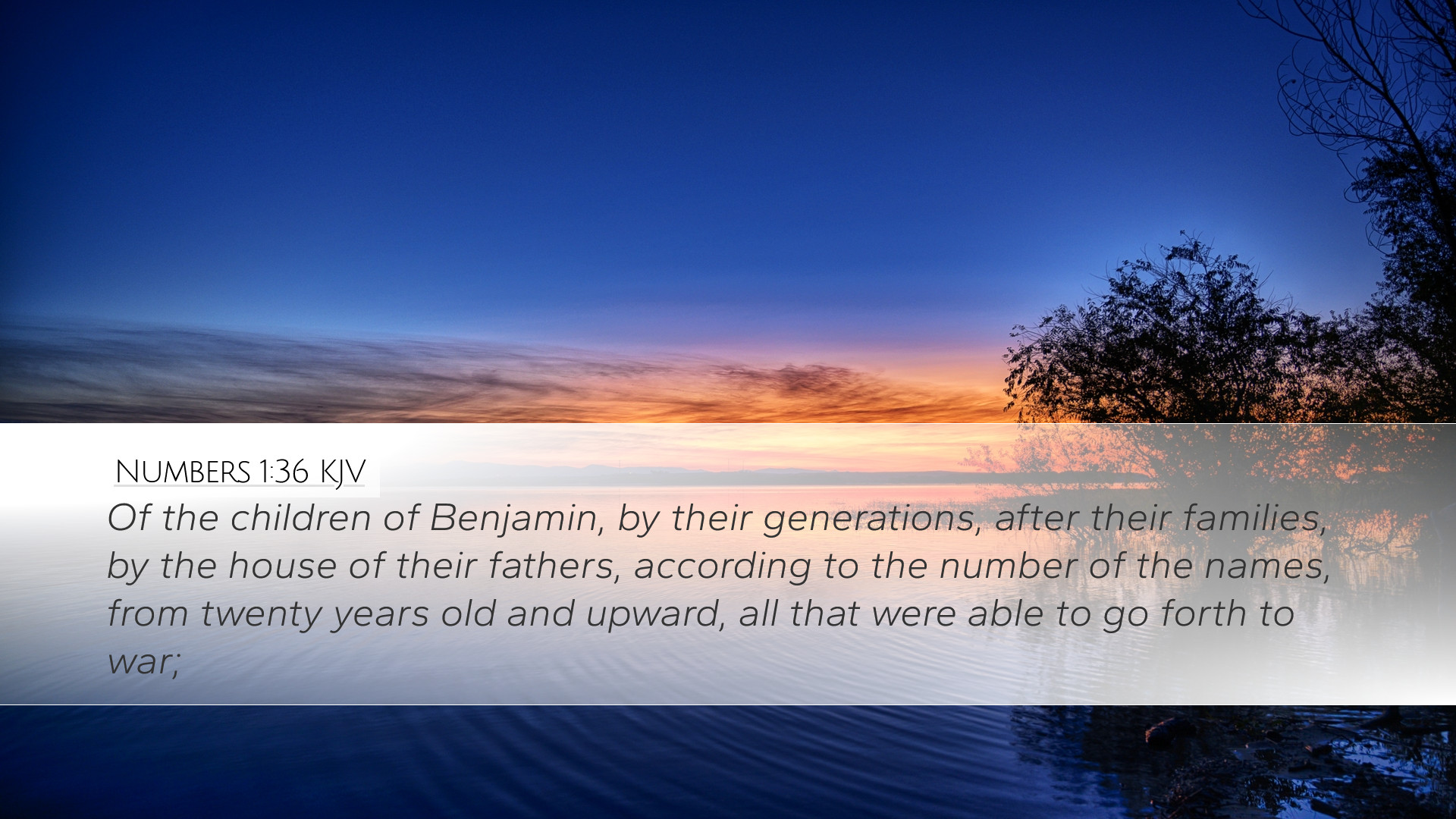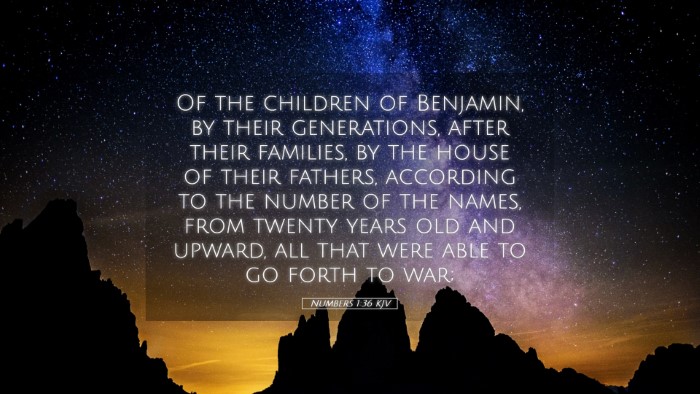Commentary on Numbers 1:36
Numbers 1:36 states: "Of the children of Dan, by their generations, after their families, by the house of their fathers, according to the number of the names, from twenty years old and upward, all that were able to go forth to war;" This verse is part of a larger passage where the Israelites are being enumerated and organized for military purposes. Below are insights drawn from various public domain commentaries that provide depth and clarity to this scripture.
Overview of Numbers 1:36
This verse specifically focuses on the tribe of Dan, detailing the process of counting the men who were twenty years and older, capable of serving in the military. Each tribe was to be numbered, allowing for effective organization under the leadership of Moses. This counting was crucial for the Israelites as they prepared to enter the Promised Land.
Insights from Matthew Henry
- Significance of Counting: Matthew Henry emphasizes that this census was more than just a numerical count; it represented God's purpose and direction for the Israelites. Each tribe, including Dan, was assigned specific responsibilities, reflecting the divine order established by God.
- The Tribe of Dan: Henry elaborates on the characteristics of Dan, being noted for its fierce independence and militaristic nature. The tribe’s role in battle was critical, and their numbers would directly impact Israel's ability to defend itself.
- Spiritual Implications: Henry also draws a parallel between this physical counting and the spiritual counting of believers today, noting that each individual has a part in the collective body of Christ, emphasizing communal responsibility and roles.
Insights from Albert Barnes
- Census Methodology: Barnes explains that the methodology of counting reflected the military discipline required of the nation as they transitioned from wandering to conquest. The detailed registration maintained order and readiness, spotlighting the principle of preparation before undertaking significant tasks.
- Dan’s Historical Context: Barnes delves into the historical context of Dan, highlighting its geographical location and the challenges it faced in claiming its inheritance. Understanding this background illuminates why the numbers registered were vital to their identity and future.
- Divine Order: He notes that the systematic way in which the children of Israel were counted showcases God's governance over His people. Barnes asserts that God is a God of order, and this verse dovetails with the theme of divine authority over organizational matters.
Insights from Adam Clarke
- Historical Relevance: Clarke provides a critical historical analysis of Dan’s lineage, emphasizing its importance in the context of Israel’s history. As the tribe known for its commerce and naval prowess, the number of warriors in Dan would later influence military strategies.
- The Role of Families: Clarke points out that each family within the tribe had its unique contribution to the military exploits of Israel. This enumeration served not only military purposes but also strengthened familial bonds and responsibilities.
- Theological Insights: He concludes with theological implications, recognizing that the organization of tribes and families resonates with the New Testament's call for church order and structure, drawing parallels between Old Testament practices and New Testament ecclesiology.
The Role of Dan in Israelite Warfare
To understand Numbers 1:36 fully, it is essential to acknowledge the strategic role the tribe of Dan played in Israel's military engagements. Known for their valiant warriors, Dan exemplifies the notion that God equips His people for battle, both physically and spiritually.
Spiritual Lessons for Today
This passage, while historical, invites contemporary applications for pastors, theology students, and scholars:
- Preparation for Ministry: Just as the Israelites prepared for battle, believers today are called to prepare for ministry through prayer, study, and discipleship.
- Valuing Each Member: The detailed enumeration illustrates the importance of every person within the body of Christ, asserting that each individual has a role to play in furthering God's kingdom.
- Unity in Diversity: The various tribes, with their distinct characteristics, reflect the diversity within the church body. Effective ministry is rooted in recognizing and mobilizing these differences towards a common goal.
Conclusion
Numbers 1:36 serves as a foundational scripture not just for understanding the military structure of the Israelites but also for realizing God's intentionality in His organization of His people. The insights from Matthew Henry, Albert Barnes, and Adam Clarke collectively remind us of the principles of order, preparation, and the significance of each believer’s role within the faith community. This verse challenges us to reflect on how we can be counted in service to God and to one another


